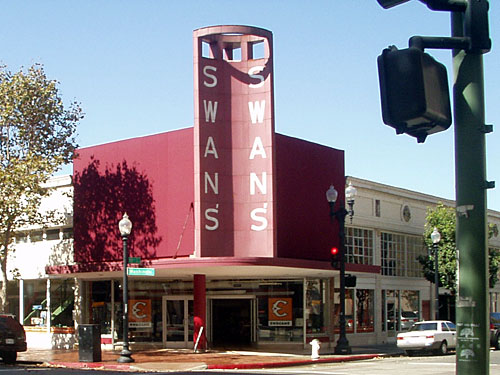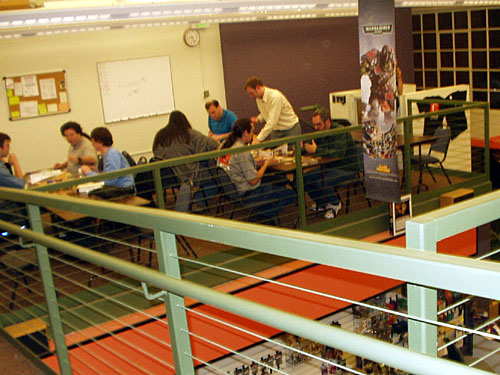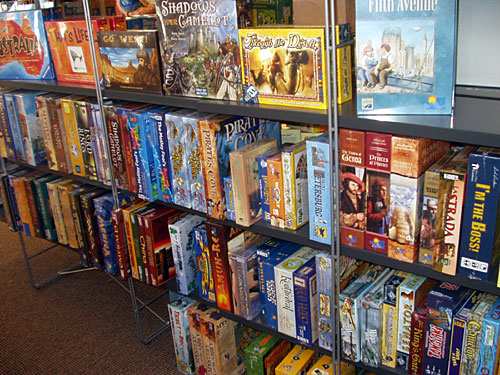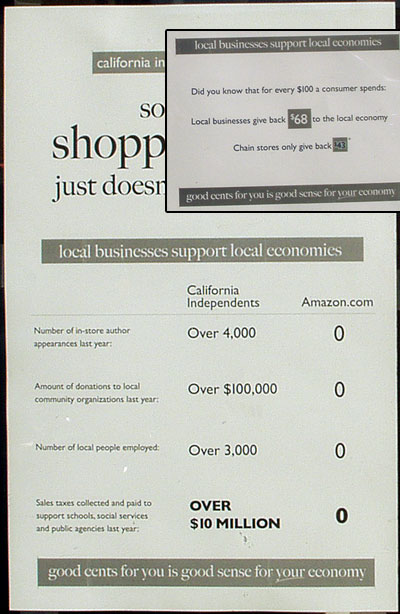 I moved to Berkeley in 1989 and discovered a game store called Games of Berkeley, located near the corner of Shattuck & University Avenue--at the edge of the downtown drag in Berkeley.
I moved to Berkeley in 1989 and discovered a game store called Games of Berkeley, located near the corner of Shattuck & University Avenue--at the edge of the downtown drag in Berkeley.I was neither particularly impressed nor particularly unimpressed with GoB when I first arrived. It seemed about on par with the game stores that I'd frequented before I went away to college. They got the newest products in promptly and had a decent depth of back stock. I mostly bought roleplaying games at the time, but I'm sure GoB had a decent selection of the Avalon Hill and Milton Bradley board games which were common at the time. And I know that they had an overdecent selection of science-fiction books, puzzles, and kites. (Yes, kites. Lots of them.)
What I didn't know was that Games of Berkeley had been purchased by the Game Gallery chain of stores shortly before my arrival in Berkeley and for the next 10+ years I saw a store where I'd once been able to actually buy gaming items slowly deteriorate. In 1991 I moved to just around the corner from GoB, and that was a good thing. GoB's ordering policy had gotten so bad by this point that if you didn't stop in the store on the day a new roleplaying product arrived you were likely to miss the initial shipment, and then odds were about 50/50 that the staff would never figure out how to reorder the book.
In 2002 I started buying games again after a several year hiatus. I'd never unlearned my GoB habit, but as I soon learned they'd gotten worse, not better, in the time I'd been less involved with the hobby. After a frustrating three to four months where I made one or two dozen trips to Games of Berkeley before I was able to get all six of the core Settlers of Catan games, I finally threw up my hands in disgust.
I knew, for utterly unknown reasons, that I was supposed to support my local store, but I couldn't see why I should keep throwing my money at them when they did everything they could not to serve me. Not only did they have bad ordering practices and bad reordering practices, but their staff had gotten increasingly aloof, unhelpful, and unprofessional. So, I ventured into the mysteries of funagain.com and timewellspent.org. And it was good. Gaming bounty was mine, with friendly staff & in-stock items.
And the discounts, oh the discounts ... Do I hear a 20%? How about a 25%? Can I get a 40%? Hallelujah!
I could buy so many games, even on a constantly tightening budget.
Locally Owned v. Local Stores
At the time I took this as a referendum against local stores which offered me nothing special, and charged higher prices for the privilege. Really, though, it was a referendum against chain stores, even small ones like Game Gallery. They're dens of mediocrity. They set up standards of business practice to minimize their costs, and in doing so ensure that no individual store actually operates well.
After the fact (Games of Berkeley since having been bought out by an independent owner) I learned that that senseless policies were being handed down to GoB by corporate higher-ups. For example each store had limits to how much they could spend on products each month, and these limits had nothing to do with sell-through rates or restocking, or whatnot. They got $XX,XXX to spend each month, period, and if they didn't spend it on the newest Magic: The Gathering, they were toast, hence the minimalist ordering policies.
This all brings me to the first point that I want to make in this article: local stores versus locally owned stores. Games of Berkeley in that time period was a local store, but it wasn't locally owned. It was a great contrast to Comic Relief, my favorite comic store for the last 14 years, which always has great staff, great selection, and a friendly atmosphere. It's got a great owner too, Rory Root, and his presence, enthusiasm, and love for the field makes all the difference, turning Comic Relief into a place that I enjoy and want to visit, as opposed to Games of Berkeley which was a source of frustration and annoyance for those many years.
In late 2004 I started visiting a new game store, EndGame. It was down in Oakland, several BART stations away, but I'd been looking to expand my gaming horizons past my Thursday night review games, where I got to play each game just once or twice, and I'd learned that EndGame had a regular game night on Wednesdays.

EndGame was such a breath of fresh air, because it was not just local, but locally owned. Their gaming area was a beautiful mezzanine that overlooked the store. It was spacious and full of tables. And gamers.

The store itself was nice too. They don't order everything, but they actually order with intelligence and forethought. Because they're local owners who are familiar with the hobbies that they serve, they're also familiar with which items their customers will actually like. So, for example, they ordered Farfalia, an interesting trick-taking game, but not the other three daVinci Games released at the same time (Abracadabra, Moby Pick, and Mr. Bill), all kinda so-so kids' games.

After I'd attended EndGame for a few months, and it was obvious that it'd become a regular part of my routine, I gave up my online ordering, except for imported items (which EndGame doesn't carry because they can't make a profit on them). It's been a tough struggle, and it's a confusing one bounded by questions of ethics and morality. Money is tight, and so I have troubles affording the games I want now that I'm paying retail, but to date I've avoided the siren call of discounters since I started EndGaming. And, unlike that strange, reasonless loyalty that I once felt to Games of Berkeley, I now understand why.
Ethics, Morality & Economy
In short, you shouldn't have blind loyalty to local stores, nor even to locally owned stores. Instead you should reward stores that provide you with services that you desire and need.
EndGame provides me with a few very important services. The most important is their gaming area. I'm there just about every Wednesday, from 6.30pm to 10.30pm or so. I get to play lots of games I really like from my own collection, and I also get to play brand-new or older games that I don't own (and often couldn't afford due to expensive secondary mearkets). I have a guaranteed set of opponents every week. (EndGame often has 20-25 people at the height of an evening.) And, I can do all this gaming without having to clean my own house before-hand or afterward (let alone the fact that my old Arts & Crafts era house doesn't have any rooms big enough for gaming to ever be truly spacious, like it is at EndGame).
Beyond that, EndGame gives me the benefits I'd expect of a good gaming store: good stocking policies, good restocking, and friendly, knowledgeable staff. They also have a used game section, which I've never actually partaken of, but which I really appreciate in a game store. I used to travel out to Gamescape in San Francisco (by bus!), just to browse their used games, so I hope to eventually come across some things I want here.
There's no doubt in my mind that I "desire and need" the services that EndGame offers. However, unfortunately this becomes a question of economics & morality for everyone who visits the store.
The question of economics is obvious. I used to buy almost all my games from timewellspent, where I'd get about a 35% discount on average. By saving up for huge orders (an inconvenience in itself) I probably ended up paying 30% off even after shipping. That's an extra game for every two purchased, which is pretty hard to argue with when you're already short on money.
Conversely, EndGame doesn't (and probably couldn't) charge for the services that I actually use and enjoy--most notably, the gaming. That's where the ethics come in. I have to make the moral jump to rewarding EndGame for the free service that they offer (gaming) by purchasing my games through them.
On the one hand, it's an obvious answer: if I (and others) didn't buy their games, then they wouldn't have the store, and thus I wouldn't have the gaming space. On the other hand, because there's no direct link between the two I could "get away" with buying all my games from discounters, and just bringing them to EndGame to play.
(Ironically there's a game that makes this exact question of community v. personal good its main point. It's Terra, by Bruno Faidutti, and though I didn't think it made a particularly good game, it was a thought-provoking one. The dilemma, by the by, is called "Olson's Paradox", and Faidutti describes it well at his website.)
We all have to make our choice on that type of morality, but I think it's important to frame the dilemma as such. It's not just a question of getting your games cheaply, but rather if your local (and probably locally owned) game store provides services that you want to continue, and if you should thus support them in the way they make available--through game purchases.
Additional Economics
What I've mentioned thus far is the question of personal economics and morality, but whether you support a locally owned store can actually be a bigger topic than that, because there's also questions of community economics and morality. In other words, you can improve your community by shopping at a locally owned store--but again it's a question of whether you're willing to put your own money out to do so.
There's a few ways in which locally owned stores can support your community.
First, there's a general understanding (though not necessarily a consensus) that brick-and-mortar stores help spread a hobby. The idea is, that if people can come into a local store that's bright, well-lit, clean, and has friendly staff, then they'll be more inclined to make a purchase, and possibly enter the field through a gateway item. If all sales are done online, the argument goes, then this avenue of attracting new people to a genre won't exist, because people are much less likely to wander through a random website than through a random store that caught their eye.
I say there's not consensus on this topic because over on the roleplaying side of things there are constant nay-sayers who claim that brick-and-mortar stores just aren't necessary. These people are increasingly making their sales through PDFs and other online formats, which disallow brick-and-mortar stores from being a possibility. Personally, I think these peoples' "success" speaks for itself; former autoships of 1500-3000 books for a mid-level roleplaying publisher are turning into first-month sales of 50-200 books for a top-level PDF publisher. If the core industry can't even be bothered, how could new people ever be brought in?
So I'll stick with the statement that a locally owned store, with an actual storefront will bring new people into our industry. And, I think I saw ample evidence of this just last night, when I saw someone wander into EndGame while I was playing, and later wander out with Shadows over Camelot and Bohnanza, two gateway games if I ever saw them.
Second, besides supporting the gaming community, locally owned stores can actually support your local community too. Book stores are another segment that is really feeling the squeeze from online sellers, and one of our local book stores has the following flyers in their window as a result:

So, besides supporting whatever good stocking, good staffing, and gaming that your locally owned store allows, shopping there can also support your hobby and your local community.
You don't have to offer that support.
You can just assume that someone else will do it, and it'll be enough to keep your local stores going for when you need them.
But shouldn't you be that someone else?
EndGame: http://www.endgameoakland.com
Comic Relief: http://www.comicrelief.net/
14 comments:
I totally agree; it is hard to have loyalty to chain stores because they are so McDonaldized. Stores like the one you describe deserve the support, because the added value is a community of gamers. The store I frequent is Game Night Games in Salt Lake City, which is based upon that model of providing additional value in return for the higher prices. It works, and yes, there are new gamers being developed there.
Steve Bernhardt
Wargamer66 on BGG
I've seen the # of game stores in Oklahoma City collapse from poor management & possibly web stores. We have one left & he gets almost all of my business because, not only do I want the gaming space, I also want the opponents.
This is one of the best written pieces I have seen on this subject and I thank you for your thoughts and time writing.
I have also been to Game Night Games. They have an atmosphere that every store should shoot for. I walked in on a weekday afternoon and the saleslady was so kind & outgoing I went ahead and made a purchase (sure it was only $5, but it was a purchase) just to support them. Later in the week I went back and had a great time playing. It was roomy, comfortable and well-lit (not blinding, though)
Support the good local owned stores.
My local, and locally owned, game store was always been known amongst my friends as "the last resort". The problem was that it was locally owned I think. The employee's were clearly the owners gaming group and were basically Magic:TG elitists who ignored anyone not like them (particularly customers as they were too busy playing Magic on the checkout counter). The gaming room was large, but filthy and you wouldn't want to use the bathroom there either. The prices were jacked up (and still are) higher than MSRP.
This store did NOT support the hobby. Admittedly they gave support to Magic:TG by having tournaments every night though. But when you walk into a store and it screams negativity and filth then you walk back out and scratch that whole "I wonder what kind of games this store I found has" thinking right off your list. Corporate standards are definitely not the only thing that makes a bad gaming store. Owners who don't take care of their business make bad gaming stores, whether they're local or not.
Over the years I went into the store less and less and everytime saw that nothing had changed. The few times I did use the game room there I always bought something (usually a couple ccg packs), but honestly I feel they did nothing to deserve the money as they didn't attract good clientele and didn't really provide anything to me but a folding table, broken chairs, and the phrase "this table is reserved for Magic, you have to move".
So I will disagree that people should always support their locally owned game stores. Support stores that support you back, not stores that actually create a negative stereotype about the hobby.
I totally agree and that matches up with what I said in my article: "In short, you shouldn't have blind loyalty to local stores, nor even to locally owned stores. Instead you should reward stores that provide you with services that you desire and need."
I have this with books, too.
Basically, what I've decided is
1. I will TRY to support my local games (books) store
2. If they are unable to supply something, and I go online, I will focus on things that are unavailable here, but the economics of overseas orders mean that it's more efficient for me to place a large order
3. If there is something mass-market that is widely available elsewhere, much cheaper, I will buy it there.
My example is books for my kids - if I want good books, I'll happily blow $250 on them - but when my daughter wants the latest "Rainbow Magic" drivel I will pick them up as deeply discounted as I can, and not consider this to be "buying books" (ie I save the $70 for something worthwhile at the specialist store).
I think it just means I end up spending more, but I feel like I've saved the moral high ground somewhat :)
EndGame is obviously a well run store. Note that one of the EndGame guys is a frequent (> 70% of the time) guest on the OgreCave Audio Report (http://www.ogrecave.com/audio/).
I only started shopping at Games of Berkeley this summer, but the selection there has been excellent(rivaling that of Endgame and with only a few kites), and the staff have been friendly and helpful. These days, Games of Berkeley is an excellent example of what a game store should be.
Games of Berkeley has improved considerably in the last couple of years since it was purchased by new management. I don't think their gaming area or staffing can compare, however.
I grew up in the Bay Area. I discovered gaming and Games of Berkeley at about the same time (when GoB) was in their first location closer to the UCB campus (circa 1979). A weekly trip to GoB became a regular part of my life until I went to Japan. Whenever I returned home to visit, I always went to GoB and as the years went by, became increasingly more and more disappointed.
Finally, after being introduced to Endgame in 2001, I said, "These guys have got it together!" Endgame is everything I could ever want from a game store, and I'm looking forward to becoming a regular there when I return to the States next year.
I worked as a supervisor in the Game Gallery in Embarcadero Center from 1991 to 1993, then in the downtown SF store in 1994, and can verify that Shannon's suspicions about Games of Berkeley are largely true.
The stores in the Game Gallery chain did have some latitude in terms of what to order, but only for the role-playing and miniatures section of the store. Everything else was handled through the corporate office. When one of the two buyers took over as manager of my store, the process worsened because now one buyer was in charge of almost everything, thus slowing down the reorder time on hot items.
As for the role-playing part of our store, I greatly increased the stock of lead miniatures and decreased the reorder time by placing orders at least twice a week, to the delight of many customers. Despite tripling or quadrupling sales, not to mention maintaining a fantastic turn-rate, the manager from corporate pointed out that the cost of our inventory of miniatures had doubled and we needed to bring it down.
He had similar troubles with our stock of magazines. I had found out that the distributor had back issues of Dragon, Dungeon, and White Dwarf, and had ordered a couple of copies of each issue. These back issues collectively sold as much as the current issue, but because our inventory had risen, I was told to cut orders. This process was repeated in other areas as well.
Even worse was the typecasting done throughout the chain. Games of Berkeley had a huge selection of chess books, while our store received the same half-dozen books each reorder and no others. Since stores could ship items to one another through the company truck, I asked the Berkeley manager for one copy of a few dozen books, and in the process discovered that these books sold at our store, too. Yet the buyer kept ordering only the same half-dozen chess books again and again.
I also brought in Avalon Hill titles and other games from the local distributor that the old manager had always avoided. Not all of them were good (e.g., Past Lives and Blind Justice), but I liked the diversity they brought to our shelves.
Enough ranting about the bad old days -- I'm glad Oakland now has a superior game store in EndGame, and I'm pleased to hear that Comic Relief is still going strong. I loved that store and its huge alternative and self-published sections, not to mention the black cat that slept on the back issues.
Pia, alas, passed away in the last year, but they now have two wonderful youngsters who dash about the (new) store and constantly lie in the middle of the floor.
yet another reason shannona is my favorite game blogger.
As a FLGS operator and the president of the local Independent Business Alliance, I applaud your column. Thank you for your personal realization of the economic and community character realities of supporting (or not) a locally-owned business.
Andy Gipe
Compleat Games & Hobbies
Pikes Peak Independent Business Alliance
Colorado Springs, CO
Speaking as a game store owner, I find alot of value in what is being said here. In the Pa,NJ,De area there are a smattering of stores around, some very good, some downright disgusting and quite a few in the middle...we do lack the abudance of chain stores however, so if a local store around here isn't doing what you'd like...the blame can be pointed at the owners.
I'm 25, ownened the store when I was 23...Philosophy major and no business creds to my name...however I understood the local community...and I agree that you shouldn't support your local store, if you aren't getting what you need there....that said...it's a hard industry...profit margins are good, but when you take into account the amount of space needed devoid of merchandise for gaming space...the prophetic guess work involved with comic ordering (oh great gods of the comic world...tell me what my customers will be buying in 2 months)...the liklihood of competetiors opening open, and folding within a year (still driving away some of your business as people flock to see the new sight...or perhaps worse, when they close their doors and discount everything losing a flood of customers, at least for awhile, to pick up dirt cheap supplies.
It's no doubt that you can buy much of what us brick and mortar stores sell at a discount on-line...but we would hope people realize a few things, these discounts are actually discounts...they are below MSRP, which does 2 things 1) it cheapens the value of the product (yes that ones still out with the jury) and 2) It means that simply put a Brick and Mortar store cannot compete, at least not with prices...we have overhead...costs of doing business...they do not.
our business outlook is this: We understand that the games we carry are not cheap, we never charge more then MRSP, and because we love the hobby and respect our customers and strive to create not just a successful financial bussiness but a striving community we support our players with a diversity of events (usually at least 12 a month, most of which are free), demo games, painting clinics, All night gaming parties, holiday parties, etc. We do it because we love it, and because to support a store in this industry where you can shop on-line, you do need to "reward" your customer with something, even if it's nothing more then a warm feeling that are helping to keep the gaming community alive, by not shopping around for a discount.
lol...ok well..was just surfing through and came upon this site, figure I'd drop my two cents in (if anyone would like change, just ask).
look forward to hearing more discussions.
Post a Comment